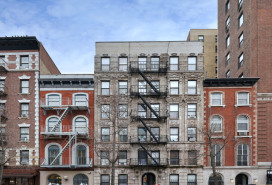If I buy an apartment, what do I do with my current lease?

I'm trying to buy an apartment at the moment, and have just renewed my two-year lease. What's the protocol? Is it likely I'll have to find someone to take over my lease? What if I don't? Can my landlord sue me for all the months until my lease is up? Is it likely in this market that that's something a landlord would do?
Particularly as the city's rental market slows down a bit, it's very much in your best interest to find a replacement tenant once you buy and are looking to move out, say our experts.
"When a tenant signs a lease they become liable for the full amount of the rent due under the terms of the lease," says Jeff Reich, a real estate attorney with SSRGA. "Thus, in the situation that is presented, the landlord can hold the tenant responsible for the full 24 months of rent if the tenant breaks the lease."
"In an 'up' market a landlord might be happy to have the space to re-let at a higher rent," notes Reich. "However, it is not clear that we are in an 'up' market in NYC at the current time."
"Landlords are stricter when the market is soft. And the rental market has been softening for a couple of years," concurs Corcoran's Deanna Kory. "The only time a landlord will allow you to break a lease is when he/she expects that they will get a higher rent."
If you find yourself looking for a new tenant to replace you (more tips on that process here), besides your own social networks, consider taking your search to sites such as LeaseBreak, RentHackr, and the Listings Project. You can also let someone else do the legwork and hire a broker—even if you end up paying the fee yourself, presumably, it will be far less money than having to pay rent for the entire rest of the lease.
Trouble at home? Get your NYC apartment-dweller questions answered by an expert! Send us your questions.
See all Ask an Expert.
You Might Also Like
























